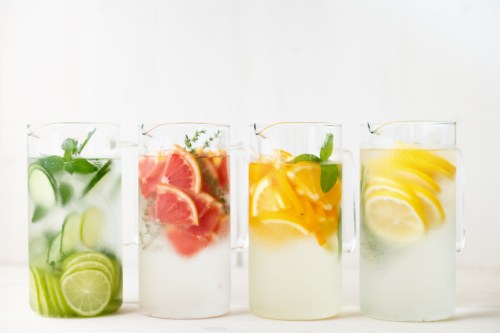It’s a little mind blowing to think about just how many sweet culinary confections are available to us today—from mocha chip frappuccinos to edible cookie dough… and who can forget the infamous cronut? With the creativity seen in desserts nowadays, added sugar never looked (and tasted) so sweet.
Experts in This Article
registered dietitian and nutrition educator with Fresh Communications
registered dietitian
But unfortunately, alongside the enjoyment of added sugar does come with some unwanted health impacts—including increased inflammation, altered gut microbiome health, and overall increased chronic disease risk. With this in mind, many of us are looking to reduce our intake while still satisfying our sweet tooth and avoiding the dreaded sugar withdrawal symptoms along the way. Enter artificial sweeteners. “Artificial sweeteners can be a simple way to limit added sugar in your diet while balancing your blood sugars—but they’re not for everyone,” says Bianca Tamburello, RDN at FRESH Communications.
When these sugar alternatives hit the market, starting all the way back in the late 1800’s, consumers couldn’t get enough of them, thinking this was their answer. Fast forward to today and lots of research has been conducted on these artificial substitutes, some of which is quite frankly concerning. Let’s find out what the data shows about the safety, nutritional value, and health impacts of the most popular artificial sweeteners.
What the science says about artificial sweeteners and their health implications
Sugar alcohols
Sugar alcohols, such as erythritol, can be easily spotted on a food label, as they usually end in –itol, with classic examples including erythritol, sorbitol, mannitol, and xylitol. But don’t worry: These are not the same kind of alcohol you’d find in wine, beer, or liquor.
Also known as polyols, sugar alcohols do occur naturally and are typically extracted from plants that produce fruit-like berries. Because of this, they technically aren’t considered a true artificial sweetener as they aren’t chemically-based and they aren’t calorie-free—typically providing anywhere between a half to a third of the calories of regular table sugar. This translates to these substitutes offering slightly less sweetness than sugar and won’t spike blood sugars in the same way, making them a fan favorite of those with metabolic concerns, like type 2 diabetes. Plus, they are much better for our oral and dental health than sugar, just like artificial sweeteners.
Sugar alcohols are most commonly known to cause gas, bloating, and diarrhea, with some consumers even citing a laxative effect.
While this all sounds ideal, there are some unfortunate side effects associated with these alternatives. Sugar alcohols are most commonly known to cause gas, bloating, and diarrhea, with some consumers even citing a laxative effect. Not exactly ideal. This is likely related to the alteration of gut bacteria associated with these sweeteners.
Concern around erythritol in particular has recently heighted with a recent study published in February of this year out of the Cleveland Clinic. It found the artificial sweetener, erythritol, to actually be associated with increased risk for cardiovascular events, including heart attack and stroke.
And for all you animal lovers out there, especially those who love to sneak Fido some human food, it’s important to note that xylitol is toxic to dogs with the potential to cause liver failure and even death. Despite these concerns, sugar alcohols are considered foods safe to consume by the FDA.
Aspartame
Commonly known as Equal, aspartame is a common artificial sweetener composed mainly of amino acids phenylalanine and aspartic acid. It does contain four calories per gram but is a staggering 200 times sweeter than sugar, typically driving consumers to use less of it.
This substitute is the most well-researched of the bunch. The first cautionary note is that those with phenylketonuria or PKU, a rare genetic disease that prevents the body from properly metabolizing the amino acid phenylalanine, should avoid this sweetener due to its composition. Aspartame is also one of the highest dietary sources of methanol, a known carcinogen and neurotoxin. While the methanol found in this sweetener is typically bound and not able to impact our health, free methanol is released upon heating aspartame—and this free form of the molecule is the one to worry about as it breaks down into formaldehyde. However, the European Food Safety Authority (EFSA) has found that methanol exposure from aspartame consumption does not pose a safety or health risk for humans.
Aspartame is also the go-to sweetener for diet soda. One study published in Diabetes Care found that diet soda consumption was linked with an increased risk of metabolic syndrome and type 2 diabetes. And while the American Cancer Society has deemed aspartame to not be linked with cancer, one animal study found the sugar substitute to be carcinogenic to rodents. Regardless, Equal or aspartame has gained stamps of safety approval from multiple credible sources including both the U.S. Food and Drug Administration (FDA) and World Health Organization (WHO).
Saccharin
Saccharin, most commonly sold as Sweet’n Low, is a non-nutritive sweetener, offering zero calories per gram and can be over 300 times sweeter than sugar. This product was actually the first commercialized artificial sweetener and became popular during World War I due to sugar shortages. Our bodies can’t actually metabolize this common sub-out for sugar, so it won’t influence blood sugars in any way.
Famously banned in over 100 countries after a 1970 study showing its correlation to bladder cancer in rats, saccharin has since been reinstated after further research showed these effects were not present in humans. However, other studies have shown that this sweetener can alter our gut microbiome health, potentially resulting in digestive and overall health concerns (as the microbiome influences so much throughout the body—from brain health, to immune health, to chronic disease expression). An animal study also found long-term consumption of saccharin to be tied to impaired liver and kidney function, but again these findings have not been shown in humans. Ultimately, saccharin is also considered a safe food additive by the FDA and WHO.
Sucralose
The final artificial sweetener we’ll highlight here is sucralose, or Splenda: the most widely used of the bunch. This calorie-free sugar substitute is made in a lab through chemical processes that yields a shockingly sweet product—around 600 times sweeter than table sugar.
Often used in cooking and baking, you can expect sucralose to not impact your blood sugars, and this has generally been shown in the available data. However, a few studies have revealed that sucralose does have an effect on glucose and insulin levels in healthy adults, like this randomized control trial published in Nutrition Journal.
Sucralose may also not be the best baking ingredient. When it’s heated above 350 degrees Fahrenheit in combination with a fat source, a substance called chloropropanol may be produced. Chloropropanols are known to be carcinogenic. Though, another study later found that sucralose in heated foods posed no health risk—however this study was funded by a manufacturer of Splenda, Tate & Lyle Ingredients. Otherwise, research published in Nutrition and Cancer found sucralose to pose no cancer risk after assessing multiple long-term studies.
When it comes to gut health, a few short-term studies, including this randomized control trial, found sucralose to have no negative impact on the gut microbiome. The only long-term study looking at this topic was done with animals, and it did find this substitute to alter gut flora while also promoting liver inflammation. Sucralose was also included in a 2022 study alongside aspartame and acesulfame potassium (another artificial sweetener), where a correlation was found between these artificial sweeteners and increased cardiovascular disease risk. Despite this conflicting evidence, this sweetener has also been recognized as a safe food by the FDA.
‘Natural’ alternative sweeteners
In addition to the artificial sweeteners discussed above, there are also natural alternative sweeteners including monk fruit and stevia. These options are derived from plants, are anywhere between 100 and 250 times sweeter than sugar, and are non-nutritive so they won’t impact your blood sugars. Because they are sourced closer to the plant and less processed, they may actually provide some beneficial plant compounds that could help reduce inflammation throughout the body.
However, stevia has been linked to disruption of gut microbiome microorganisms and the EFSA panel concluded that there isn’t enough evidence to deem monk fruit’s safety—although it has been approved for safe use in the US by the FDA, alongside stevia.
The bottom line
So, what should you do with all this research-intensive information? Well, the bottom line is that while many of these artificial sweeteners have been studied fairly extensively and considered safe in the U.S., each brings up questions of concern when it comes to our health and poses unanswered questions. For this reason alone, the safest bet is to either avoid these options or use them sparingly.
The bottom line is that while many of these artificial sweeteners have been studied fairly extensively and considered safe in the U.S., each brings up questions of concern when it comes to our health and poses. unanswered questions
“Given that artificial sweeteners may cause unpleasant GI symptoms and trigger migraines in some people, I recommend trying to eat less added sugar to meet your goals as opposed to turning to artificial options—especially if you don’t like the taste or prefer to eat mainly whole foods,” Tamburello adds.
Thankfully, there are so many delicious sweetener options that are sourced even more naturally than stevia and monk fruit, including maple syrup, coconut sugar, and honey. Adding fruit, no sugar-added homemade fruit syrups, and dates to your baked goods are also great ways to impart sweetness with the added benefit of fiber, vitamins, minerals, and plant compounds.
No matter which sweetener you choose—artificial, alternative, natural, or otherwise—it’s always a great practice to try to reduce how often we’re sweetening our food. This helps to break that positive feedback loop of needing more and more sweet treats throughout our days.
Listen to a dietitian explain the best sugar options:
Sign Up for Our Daily Newsletter
Get all the latest in wellness, trends, food, fitness, beauty, and more delivered right to your inbox.
Got it, you've been added to our email list.











